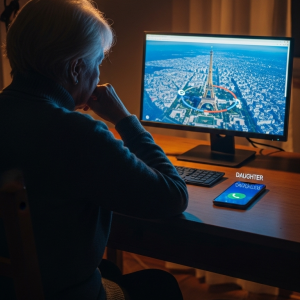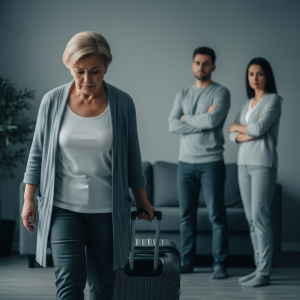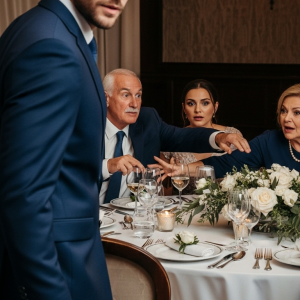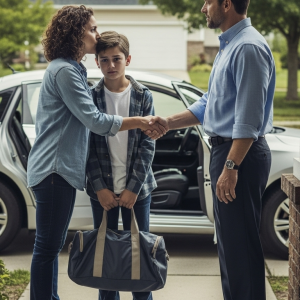My eight-year-old daughter was on life support when my mother texted, “Bring cupcakes for your niece’s school party tomorrow.” I replied, “I can’t. I’m in the hospital with my daughter, who’s fighting for her life.” She coldly texted back, “You always ruin everything with your selfish drama.” My sister added, “Stop being so dramatic. Kids get hurt all the time.” My own father’s text followed: “Your niece’s party is more important than your attention-seeking.” I froze, staring at my phone, shattered by their cruelty. Then, the doctor came in with news about my mother that made my blood run cold.
My name is Elena, and I’m a single mom to Kaia, the most incredible eight-year-old in the world. Since her father walked out, it’s been just the two of us. I’m a nurse, a detail that would become horrifyingly relevant. My family is… complicated. My mother, Monica, is the sun around which our family is expected to orbit. My sister, Naen, is her golden child, living a perfect life with a lawyer husband and two perfect children, Erica and Noel. My father, Franklin, simply agrees with whatever keeps the peace. I’ve always been the black sheep, the one who “causes drama” by having needs.
It was a Tuesday afternoon when my world ended. I was at work in the pediatric ward when Kaia’s school called. A drunk driver had slammed into the school bus. Kaia was being airlifted to the trauma center. I don’t remember the drive. I only remember the doctor’s face as he told me my daughter had suffered severe head trauma and was in surgery, fighting for her life.
When they finally let me see her, my vibrant, beautiful girl was small and still, surrounded by machines that breathed for her. She was on life support, in a medically induced coma. I called my mom that night, sobbing. “I can’t do this alone,” I whispered. “Kaia might not make it.” “Oh, Elena,” she sighed, the sound of her impatience crackling over the phone. “You’re always so dramatic. Kids are resilient. She’ll be fine.” That should have been my first warning.
For three days, I lived in that room, holding Kaia’s hand, reading her favorite books aloud, praying she could hear me. On Friday, the texts started. Mom: Elena, don’t forget to bring cupcakes for Erica’s school party tomorrow. The ones with the pink frosting she likes. I stared at the screen. My niece was also eight. My mother was texting me about cupcakes while my daughter lay on the edge of death. Me: I can’t. I’m in the hospital with my daughter, who’s fighting for her life. The response was instant. Mom: You always ruin everything with your selfish drama. I gasped. A nurse asked if I was okay. I wasn’t. Then, my sister chimed in. Naen: Stop being so dramatic. Kids get hurt all the time. Erica’s been looking forward to this party for weeks. Don’t disappoint her because you want attention. I felt physically ill. Dad: Your niece’s party is more important than your attention-seeking. You’ve always been jealous of Naen’s family. Stop using your daughter to get sympathy.
I was staring at the phone, tears blurring the screen, when Dr. Rowan Ellis, Kaia’s doctor, walked in. “Elena,” he said gently, “I have some news about your mom.” My heart stopped. “We ran Kaia’s blood work again,” he began, then paused, looking uncomfortable. “Your mother called the hospital this morning. She tried to get information about Kaia’s condition. She also… asked about Kaia’s inheritance situation. Specifically, if there was a life insurance policy and who the beneficiary would be if Kaia didn’t survive.” The blood drained from my face. “She told our social worker she was concerned about the financial burden,” Dr. Ellis continued, his voice careful. “She asked about brain death protocols, how long we typically keep patients on life support, and the process for… making difficult decisions. She also asked about organ donation and if there were any financial benefits.” I felt like I was going to vomit. My own mother had called the hospital where I worked and asked about killing my daughter for money. That’s when my grief turned to ice-cold rage. That’s when I decided to get revenge.
My first move was to screenshot every single cruel text message. Then, I began documenting everything: every call, every interaction, every casual cruelty. I was building a case. The next morning, I called Naen. “Naen, Mom called the hospital yesterday.” “Oh, good. Finally showing some support.” “She asked about ending Kaia’s life support and if there was life insurance money involved.” The silence on the other end of the line was deafening. “That’s… ridiculous,” she finally stammered. “Mom wouldn’t.” “I can have Dr. Ellis call you to verify.” Another long pause. “Well, Kaia’s care is expensive,” Naen said, her tone defensive. “Mom’s just being practical.” I hung up. Over the next week, the messages continued. Not asking about Kaia, but asking when I would be available to babysit, plan my mother’s birthday party, or run errands. Naen even sent me a bill for the cupcakes she’d had to buy for Erica’s party.
Then came a call that changed everything. It was my Aunt Daphne, my mother’s sister, from two states away. “Elena, honey, I just heard! I’m so sorry. How is she?” For the first time, I heard genuine concern. I broke down, telling her everything. “I wanted to call sooner,” Daphne said, her voice strained. “But Monica told me you didn’t want to be bothered. She said you were being dramatic, that Kaia had a minor concussion and you were milking it for attention.” My mother had been actively isolating me, lying to the family to prevent anyone from offering support. Daphne arrived that weekend, her car filled with food and a giant teddy bear for Kaia. She was a shield. When my mother called, Daphne took the phone. “Monica, this is Daphne,” she said, her voice like steel. “I’m sitting here looking at my great-niece, who is recovering beautifully. I understand you called the hospital and asked about killing your granddaughter for money. I have never been more ashamed to call you my sister.” My mother hung up.
That evening, Daphne sat me down. “Elena, this isn’t the first time. When your grandmother was dying, Monica asked the doctors about… speeding up the process. She was focused on the inheritance.” The pieces were finally falling into place. My mother wasn’t just callous; she was predatory. Her cruelty wasn’t a mistake; it was her nature.
Before Daphne left, I had a plan. I called my family’s lawyer and, recording the call, informed him of my mother’s actions. He audibly gasped. Then, I reached out to Naen’s mother-in-law, Sylvia. She was a powerful woman in our small town—on the hospital board, friends with the superintendent, and she had always seen through my family’s facade. She was horrified by what I told her. “Elena, honey, I had no idea,” she said, her voice grim. “What can I do to help?” With Sylvia as my ally, the quiet, systematic takedown of my family began.
In a small town, news travels fast, especially when orchestrated by someone as connected as Sylvia. The consequences were swift and brutal.
The first to fall was Naen’s husband, David. He was on the partnership track at his family law firm. Suddenly, senior partners—friends of Sylvia—were questioning his judgment. “What kind of man,” they wondered aloud, “stays married to a woman who supports ending a child’s life for insurance money?” David was demoted, his career effectively stalled.
Next was my mother. The pastor of her church, having heard the story from his wife who worked at the hospital, quietly terminated her position as church treasurer. He suggested she take some time to “reflect on Christian values of compassion.”
My father’s construction business began to hemorrhage clients. In a community where family values were paramount, the news that he had called his dying granddaughter’s ordeal “attention-seeking” was a death sentence. His largest client canceled a major contract. Within six months, his business was bankrupt.
They tried to fight back. My mother showed up at the hospital, demanding to see Kaia. “I’m her grandmother! I have rights!” she screamed in the lobby. My colleague, nurse Janet, informed security that there was a no-contact order on file. Hospital security escorted my mother out, a scene witnessed by dozens.
Then she went to Kaia’s school, asking questions, trying to dig up dirt, suggesting Kaia had behavioral problems that might have contributed to the accident. She was trying to build a narrative where her actions seemed reasonable. I called a lawyer friend of Sylvia’s, and we filed a formal restraining order. At the hearing, the judge reviewed the evidence—the cruel texts, the hospital’s report on her phone calls, the school incident. “Mrs. Thompson,” the judge said, his voice cold. “Your pattern of behavior shows a concerning lack of empathy. This restraining order is granted, and I’m extending it to include your husband, based on his documented harassment.”
The fallout for Naen was the most public. Her affair with her personal trainer became common knowledge. During her ugly divorce and custody battle, David’s lawyer read her own text messages aloud in open court. “Stop being so dramatic. Kids get hurt all the time.” The courtroom gasped. The judge awarded David primary custody, with Naen only getting supervised visitation until she completed parenting classes.
The financial pressure, legal fees, and social ostracization became too much. My parents were forced to sell their house and move into a small, sad apartment across town. My mother’s social circle had evaporated. She was utterly alone.
Kaia’s recovery was nothing short of miraculous. Three weeks after the accident, she woke up. A month later, she was home, thriving in physical therapy. We planned a small party to celebrate her return.
During this time, I had one final, direct confrontation with my family. My father showed up at the hospital, blocking my path. “Elena, this has gone too far. You’re destroying the family over a mistake.” “A mistake?” I asked, my voice dangerously quiet. “Tell me, Dad, how is asking about organ donation benefits for my living daughter a ‘mistake’?” “You’re being dramatic, just like always! Kaia is fine now, isn’t she?” “Get out,” I said, my voice shaking with rage. “Get out before I call security.” He left, his face red with fury. Dr. Ellis, who witnessed the exchange, later told me it was a textbook example of emotional abuse.
Life moved on. Sylvia introduced me to her son, Dean, a pediatric nurse. He was kind, patient, and wonderful with Kaia. We started dating. An unexpected inheritance from a great-aunt gave us a fresh start, allowing me to buy a small house for Kaia and me.
I realized the poison my family spread was even affecting their own. Kaia’s teacher told me that my niece, Erica, had been telling other children that Kaia was “faking it for attention.” The other kids had started avoiding her. In their campaign against me, my mother and sister had managed to isolate their own golden child.
I reached out to Naen, but not for a reconciliation. “I’m calling about Erica,” I said. “She’s innocent in all this. If she ever needs anything, a safe place, she can always come to me.” Naen broke down, sobbing, apologizing. I accepted her apology for what it was—the desperate cries of a woman who had lost everything—but I made it clear that forgiveness was not on the table. “Erica is my niece and I love her,” I said. “She doesn’t deserve to pay for your choices.”
A year and a half after the accident, Kaia and I attended Erica’s ninth birthday party. My parents and Naen weren’t there. They hadn’t been invited. As we were leaving, Erica ran up and hugged me. “Aunt Elena,” she said. “I’m sorry about what Grandma Monica said. I know Kaia wasn’t faking. I’m glad she’s okay.” I hugged my niece, my heart aching for the innocence she had almost lost.
Eighteen months later, our new life is better than I could have imagined. Kaia is nine, plays soccer, and wants to be a doctor. Dean and I got married last spring. Kaia was our flower girl, and Sylvia walked me down the aisle. Our chosen family filled every seat.
The revenge I got wasn’t loud or dramatic. I simply let them face the natural consequences of their own cruelty. Their reputations were destroyed not by my actions, but by their own words.
The final, bitter irony came six months ago. My mother, diagnosed with early-stage breast cancer, reached out for help. “Family should stick together during a health crisis,” she wrote. I texted her back. “I can’t. I’m busy with my own family. Besides, I’m sure your church friends can help. After all, a family that prioritizes school parties over dying children probably has different ideas about what constitutes an emergency.” I never heard from her again.
Kaia asked me recently if she’ll ever see her other grandparents. I told her the truth: that sometimes, people make choices that hurt the ones they’re supposed to love, and it’s okay to love them from a safe distance. “But we have Grandma Sylvia,” she said, referring to Dean’s mother, who adores her. “Yes, we do,” I agreed. “We have a wonderful family.” “Just not the one we started with,” she said with the simple wisdom of a child who learned too early that family is about who shows up.
That night, as I tucked her into bed, she asked, “Mommy, are you happy?” I looked at my daughter—alive, healthy, safe, and surrounded by unconditional love—and I realized I had never been happier. “Yes, baby,” I said, and I meant it. “I’m very happy.” We didn’t need the people who abandoned us in our darkest hour. We found the people who showed up with coffee and support. We built a life with them. And the cupcakes, as it turned out, were never important at all.




